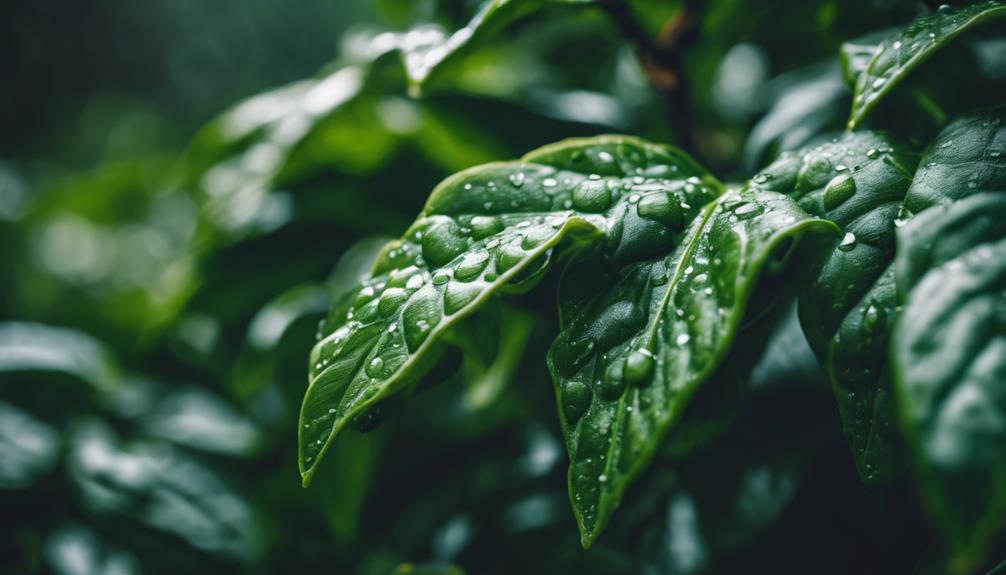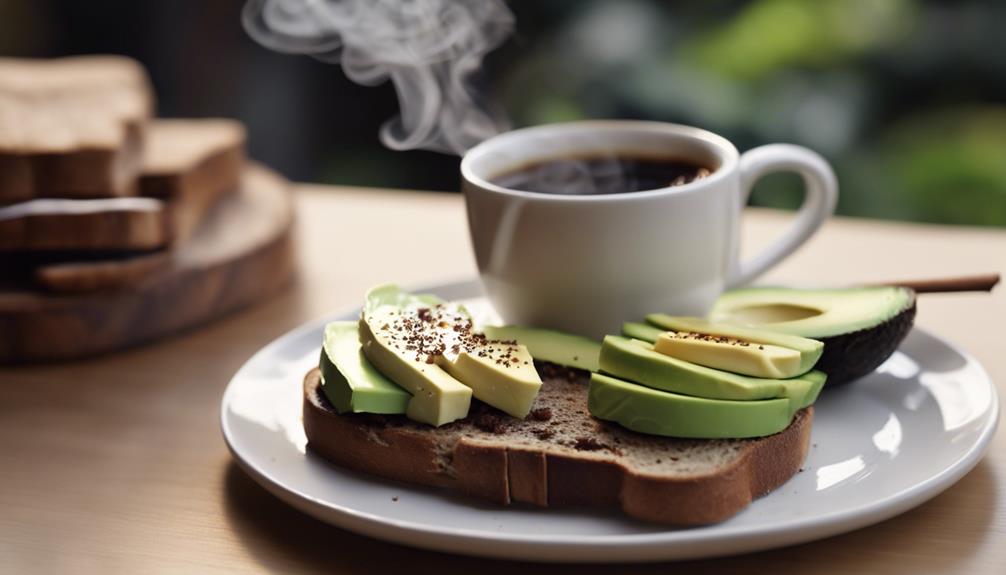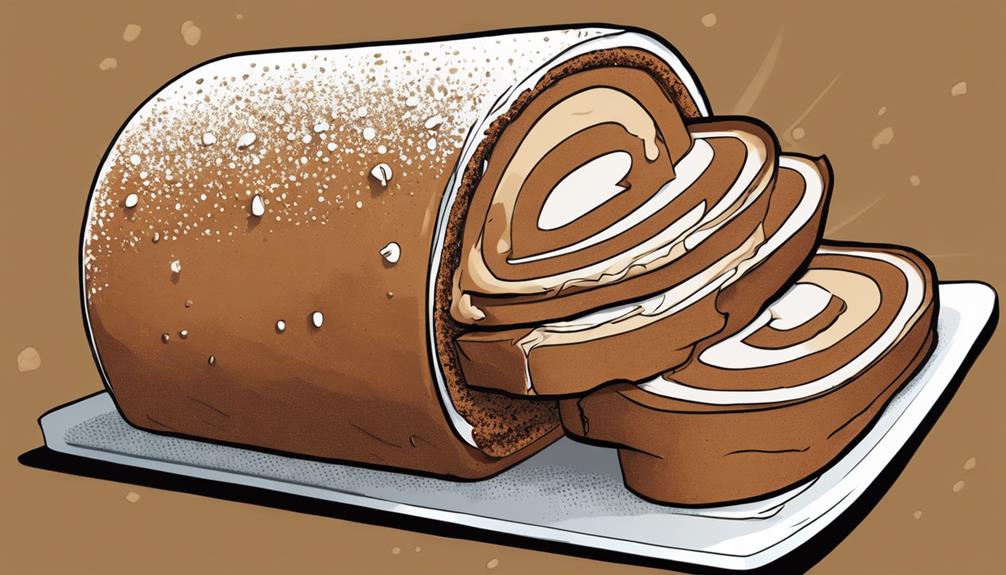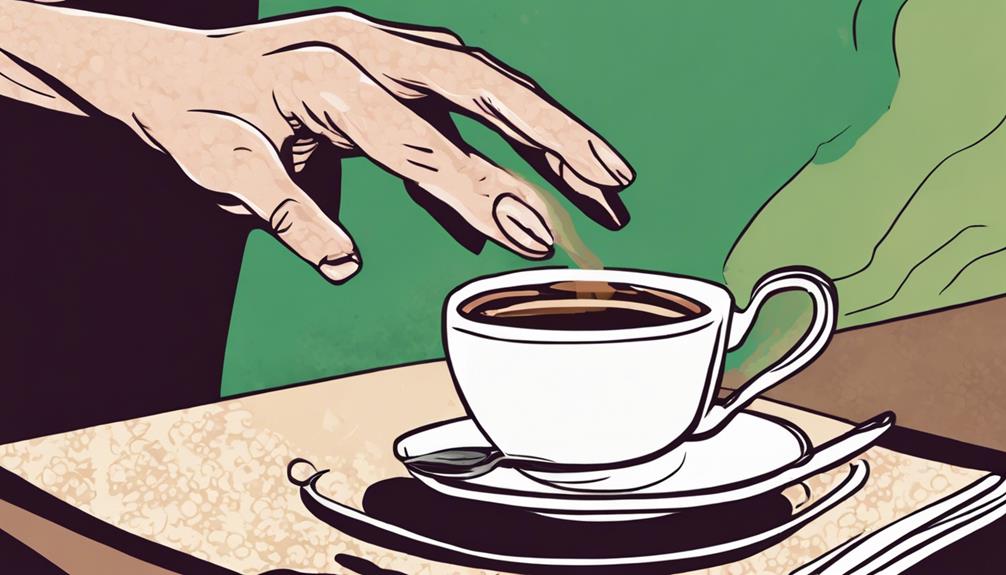Yes, coffee leaves do contain caffeine. In dried teas, you can find an average of 20mg per serving, with 12oz iced teas made from coffee leaves offering around 35mg of caffeine. While coffee leaves have lower caffeine levels compared to coffee beans, they still provide a mild energy boost. This caffeine contributes to the invigorating taste of coffee leaf tea, similar to light green tea. If you want to discover more about the caffeine content and unique benefits of coffee leaf tea, further information awaits.
Key Takeaways
- Coffee leaves contain an average of 20-35mg of caffeine per serving.
- Caffeine in coffee leaves is similar to light green tea.
- Coffee leaf tea provides a mild energy boost.
- Lower caffeine levels in coffee leaves compared to beans.
- Caffeine content contributes to the invigorating taste of coffee leaf tea.
Caffeine Content in Coffee Leaves
Coffee leaves contain an average of 20mg of caffeine per serving in dried teas. This caffeine content is similar to that found in light green tea.
For those seeking a mild caffeine boost, 12oz cans of iced teas made from coffee leaves offer around 35mg of caffeine.
Contrary to common misconceptions, consuming coffee leaf tea provides a vital and revitalizing clarity without the common side effects like jitters or fatigue associated with other caffeinated beverages.
The caffeine present in coffee leaves plays an essential role in the invigorating taste of coffee leaf tea, offering a unique drinking experience that's both stimulating and soothing.
Comparison to Coffee Beans
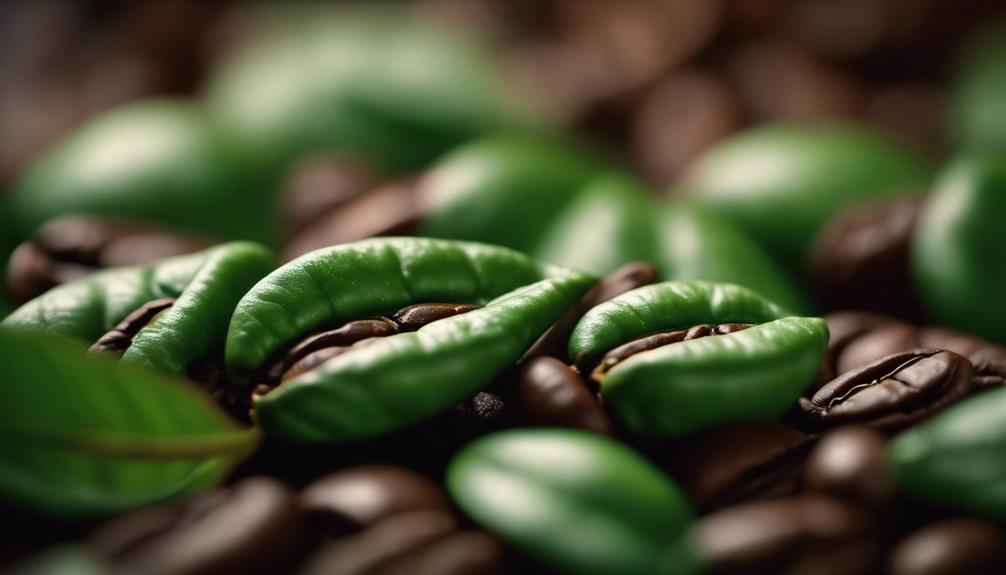
Coffee leaves, unlike coffee beans, contain lower levels of caffeine, typically ranging from 20-35mg per serving.
This distinction in caffeine content between coffee leaves and beans is important when considering the effects of brewed beverages.
When brewing coffee leaf tea, the caffeine clarity experienced is significantly smooth and predictable, offering a unique alternative to traditional coffee beverages.
Caffeine in Coffee Leaves
When comparing caffeine content, coffee leaves contain significantly less caffeine than coffee beans. Coffee leaves typically have caffeine levels ranging from 0.01% to 0.21%, whereas coffee beans boast higher caffeine concentrations, usually between 1.1% to 2.2%.
The difference in caffeine content between coffee leaves and beans is quite significant. Despite the lower caffeine levels in coffee leaves, they still contribute to the mild energy boost experienced when consuming coffee leaf tea. The caffeine present in coffee leaves plays a role in the stimulating effects of coffee leaf tea once it's brewed.
Hence, while coffee leaves do contain caffeine, the amounts are considerably lower compared to those found in coffee beans. This distinction is important when considering the caffeine content in coffee and tea products derived from coffee leaves. Coffee beans are legumes, which means they are naturally higher in caffeine compared to other plant parts. In contrast, the caffeine content in the leaves is much lower, making them a suitable alternative for individuals looking to reduce their caffeine intake. Additionally, the lower caffeine content in coffee leaves may make them a more attractive option for those who are sensitive to the stimulant’s effects.
Caffeine Content Comparison
In comparing caffeine content, coffee leaves exhibit lower levels than coffee beans. When examining the caffeine content of coffee leaf tea, you'll find that it contains approximately 20mg of caffeine per serving, which is markedly less than the around 95mg found in a standard 8oz cup of brewed coffee.
Here are some key points to keep in mind in this comparison:
- Moderate Caffeine Levels: Coffee leaf tea offers a milder caffeine experience compared to coffee beans, making it a suitable choice for those looking for a gentler energy boost.
- Smooth and Predictable: Despite containing caffeine, coffee leaf tea is known for its smooth and consistent clarity, providing an enjoyable and agreeable beverage option.
- Similar to Green Tea: The caffeine content in coffee leaves is akin to that found in light green tea, offering a moderate pick-me-up without the potential jitters associated with stronger caffeinated beverages.
- Ideal for Sensitivity: Due to its lower caffeine content, coffee leaf tea is a preferred option for individuals sensitive to caffeine but still looking for a flavorful and energizing drink.
Brewing Coffee Leaf Tea
For a unique brewing experience that sets coffee leaf tea apart from traditional coffee beans, consider steeping dried coffee leaves in hot water. The infusion made from coffee leaves offers a smooth and lightly sweet flavor profile, distinct from the bold taste of brewed coffee. The process of brewing coffee leaf tea involves a similar method to making traditional tea, resulting in a milder caffeine content compared to coffee beans. This makes coffee leaf tea a suitable alternative for individuals looking to reduce their caffeine intake while still enjoying a flavorful beverage. Apart from its taste, coffee leaf tea is also known for its antioxidant properties, providing additional health benefits to those who indulge in this delightful drink. Embrace the refreshing and caffeine-light option of coffee leaf tea for a unique beverage experience that combines flavor with wellness.
| Aspect | Coffee Leaf Tea | Coffee Beans |
|---|---|---|
| Flavor Profile | Smooth and lightly sweet | Bold and robust |
| Caffeine Content | Milder compared to coffee | High caffeine levels |
| Brewing Method | Similar to traditional tea | Requires coffee maker |
Benefits of Coffee Leaf Tea
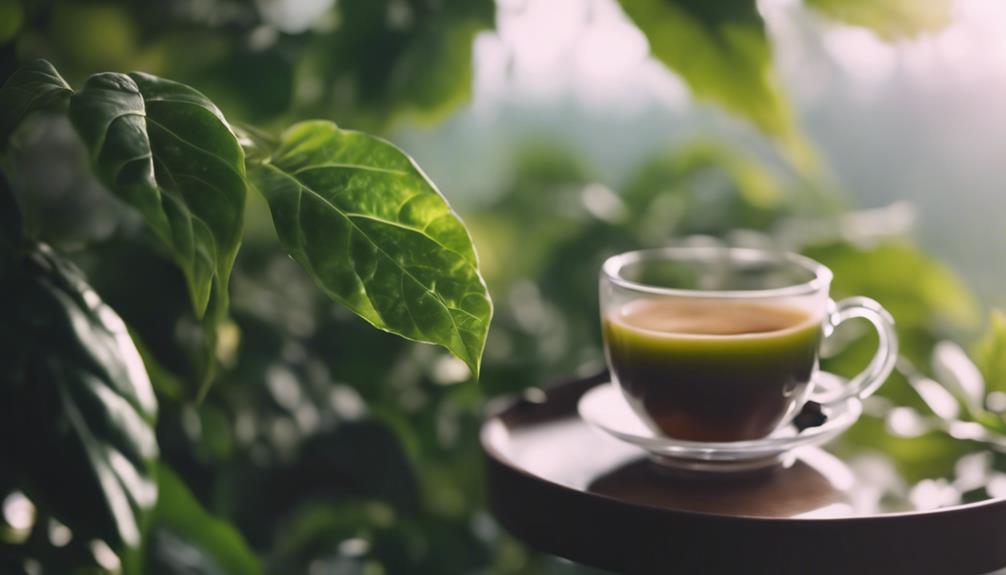
Explore the numerous benefits that coffee leaf tea offers, from its lower caffeine content to its rich antioxidant properties.
- Lower Caffeine Content: Coffee leaf tea provides a milder energy boost compared to traditional coffee, making it a great option for those seeking to reduce their caffeine intake.
- Antioxidant Rich: Packed with antioxidants, this herbal infusion may offer various health benefits such as reducing inflammation and potentially lowering cholesterol levels.
- Sustainable Production: By utilizing coffee plant leaves that would otherwise be discarded during pruning, coffee leaf tea promotes sustainability and environmental consciousness.
- Unique Flavor Profile: With a taste reminiscent of black tea but with delightful hints of chocolate and vanilla, coffee leaf tea offers a distinctive and enjoyable drinking experience.
With its potential health benefits, sustainable production methods, and unique flavor profile, coffee leaf tea stands out as a versatile and flavorful alternative to traditional caffeinated beverages.
Side Effects of Caffeine

Monitoring your caffeine sensitivity is essential to be aware of potential side effects such as jitteriness, increased heart rate, and difficulty sleeping.
It's important to be mindful of your caffeine sensitivity as some individuals may experience restlessness, anxiety, or digestive issues with even small amounts.
Keeping track of your caffeine consumption from coffee leaves is vital to prevent potential negative impacts on your health and well-being.
Caffeine Sensitivity Risks
Be mindful of your caffeine sensitivity when consuming coffee leaf products to prevent potential adverse reactions. Coffee leaves, though generally containing less caffeine than coffee beans, can still pose risks to individuals sensitive to caffeine.
Here are some key points to keep in mind:
- Monitor Your Intake: Keep track of how much coffee leaf tea you consume to avoid surpassing your caffeine threshold.
- Know Your Limits: Understand your body's response to caffeine and adjust your consumption accordingly.
- Stay Hydrated: Counter the diuretic effects of caffeine by drinking plenty of water throughout the day.
- Listen to Your Body: If you experience symptoms like palpitations or restlessness, consider reducing your caffeine intake.
Overconsumption Effects
Consuming an excessive amount of caffeine from coffee leaves can result in various side effects, including jitteriness, restlessness, and an increased heart rate. Overconsumption may also lead to insomnia, anxiety, digestive issues, and headaches.
It's important to remember that individuals have different tolerances to caffeine, so monitoring your intake is essential to avoid these side effects. High levels of caffeine can negatively impact sleep quality and overall well-being.
Moderation is key to enjoying the benefits of caffeine from coffee leaves without experiencing these adverse effects.
Health Implications of Caffeine
When consuming caffeine from coffee leaves, it's important to be mindful of the potential health implications, including various side effects that can arise. High levels of caffeine found in coffee leaves can have several negative impacts on your health.
Here are some side effects to watch out for:
- Insomnia: Excessive caffeine intake can disrupt your sleep patterns, leading to difficulty falling asleep or staying asleep.
- Digestive Issues: Some individuals may experience stomach upset or acid reflux due to the caffeine present in coffee leaves.
- Headaches and Anxiety: High caffeine levels from coffee leaves can trigger headaches and increase feelings of anxiety and restlessness.
- Dependency and Withdrawal: Consuming too much caffeine from coffee leaves may result in dependency, causing withdrawal symptoms like fatigue and changes in mood.
Monitoring your caffeine intake from coffee leaves is essential, especially if you're sensitive to its effects, to prevent these adverse health outcomes.
Harvesting and Processing Methods
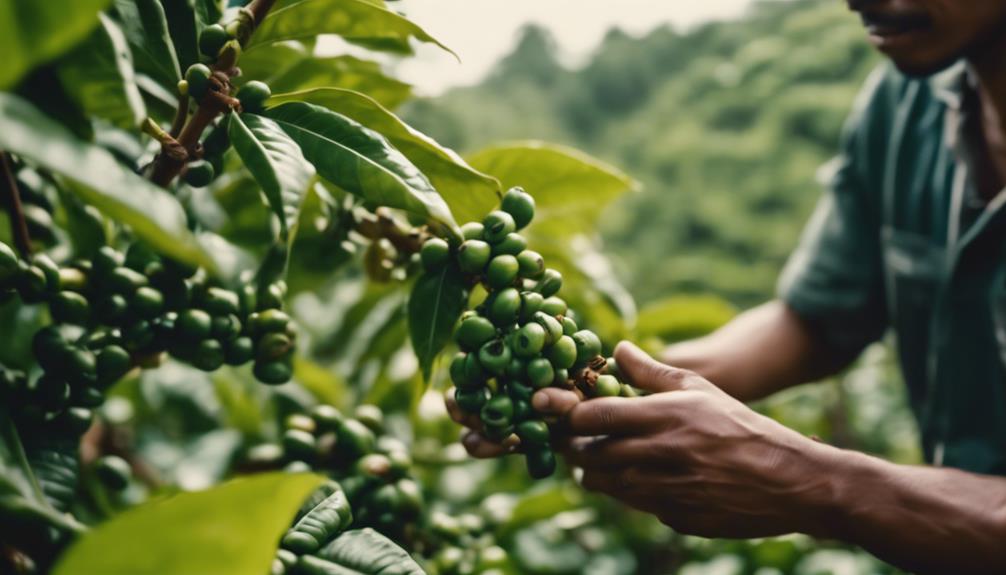
During the harvesting and processing of coffee leaves, special techniques are employed to concentrate the caffeine content found in the leaves. The process begins with carefully selecting mature leaves, ensuring ideal caffeine levels.
After harvesting, the leaves undergo a meticulous drying process that helps enhance the caffeine concentration. By utilizing specific drying methods, such as air-drying or oven-drying, the caffeine content in coffee leaves can be maintained at levels that provide the energizing properties associated with coffee leaf tea.
Moreover, the processing methods play an essential role in preserving the caffeine content in coffee leaves. Techniques like controlled fermentation and gentle handling during processing ensure that the caffeine levels remain stable. These methods not only concentrate the caffeine but also contribute to the distinct flavor profile of coffee leaf tea.
Through a combination of precise harvesting and processing techniques, coffee leaf tea offers a milder caffeine boost compared to traditional coffee beverages, making it an appealing alternative for those seeking a gentler pick-me-up.
Flavor Profile of Coffee Leaf Tea
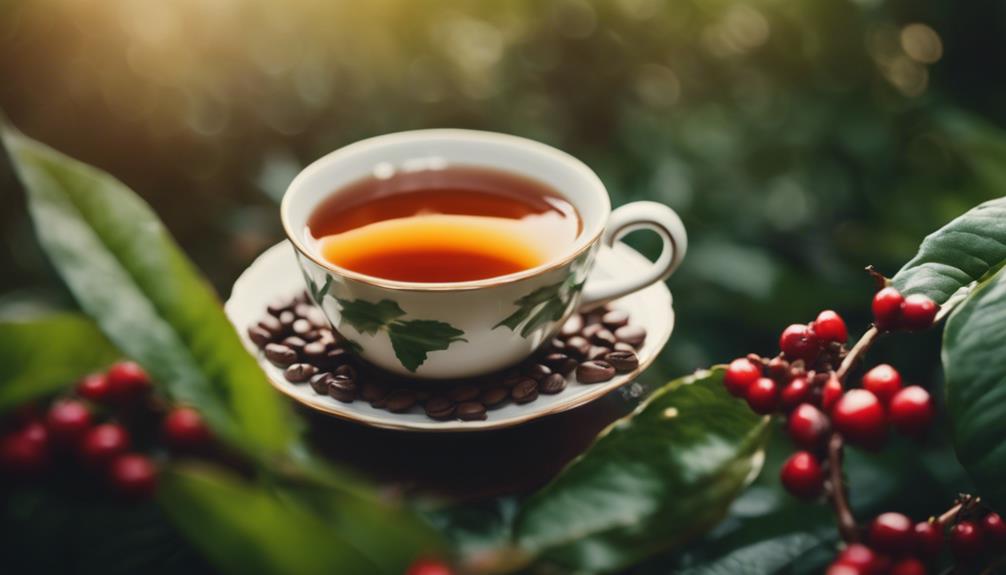
The flavor profile of coffee leaf tea resembles that of black tea, boasting sweet hints of chocolate and vanilla.
When you indulge in a cup of coffee leaf tea, you can expect:
- A smooth mouthfeel with low astringency, ensuring a pleasant sipping experience.
- A change in flavor during the second infusion, with more vegetal notes emerging to offer a different taste profile.
- Access to recommended brewing instructions that help extract the best flavors from the tea leaves, enhancing your overall tea-drinking experience.
- An invigorating taste that lacks bitterness, distinguishing coffee leaf tea as a delightful alternative to traditional teas.
Embrace the delightful combination of chocolate and vanilla notes in this unique tea, which provides a distinct and enjoyable flavor experience.
Potential Rise in Popularity

Coffee leaf tea's increasing popularity stems from its unique taste, health benefits, and sustainable production practices. With approximately five million current consumers globally, there's substantial potential for market growth. The recent approval by the European Food Safety Authority in 2020 has further boosted the prospects for coffee leaf tea, particularly in the European market, expanding its appeal to a wider audience. However, a key challenge lies in educating consumers about the distinct flavor profile and health advantages of coffee leaf tea to drive widespread acceptance.
The sustainability and year-round harvest of coffee leaf tea resonate with environmentally conscious individuals seeking alternatives to conventional teas and coffees. As more people become aware of the health benefits associated with coffee leaf tea, such as its high antioxidant content and potential positive effects on metabolism, its popularity is poised for a significant upsurge. By highlighting these aspects, coffee leaf tea is positioned to attract a broader consumer base looking for a flavorful, health-conscious beverage option.
Frequently Asked Questions
Can You Eat Coffee Plant Leaves?
You can consume coffee plant leaves, but it's not common due to their bitter taste and higher caffeine content. Opting to brew coffee leaf tea is a more popular choice.
The caffeine levels in coffee leaves can fluctuate based on factors like plant type and leaf maturity.
While drinking coffee leaf tea is a viable option, eating the leaves directly mightn't be as enjoyable as savoring them in brewed form.
Are Coffee Leaves Good for You?
Coffee leaves can be beneficial for you due to their lower caffeine content compared to beans, offering a milder energy boost. Research indicates potential advantages such as antioxidant properties, anti-inflammatory effects, and positive impacts on metabolism and blood sugar.
Incorporating coffee leaves into your diet may provide a flavorful and health-promoting addition to your routine. This alternative to traditional coffee can be a gentle yet beneficial choice for those seeking a more subtle pick-me-up.
Can You Use Coffee Leaves for Tea?
Yes, you can use coffee leaves to make tea. Coffee leaf tea is crafted from the leaves of the coffee plant, offering a unique and milder caffeine experience compared to traditional coffee.
It provides a different flavor profile and is a sustainable way to utilize the plant, benefiting farmers economically.
Brewing coffee leaf tea is akin to preparing traditional tea, making it a suitable option for those seeking a lower caffeine alternative without compromising on taste.
How Much Caffeine Is in Coffee Tea?
In coffee leaf tea, the caffeine content typically ranges from 20-35mg per serving, similar to light green tea. This amount offers a milder caffeine boost compared to traditional coffee.
Enjoying coffee leaf tea can provide a gentle and predictable increase in alertness without the common side effects like jitters or fatigue.
Conclusion
To wrap up, coffee leaves do contain caffeine, albeit in lower levels compared to coffee beans.
While coffee leaf tea offers a unique flavor profile and potential health benefits, it's important to be mindful of the side effects of caffeine consumption.
With proper harvesting and processing methods, coffee leaf tea may see a rise in popularity as an alternative to traditional coffee beverages.
Remember, always verify information to guarantee accurate understanding and make informed choices.
